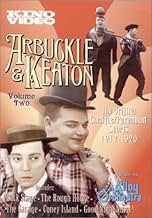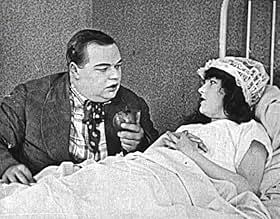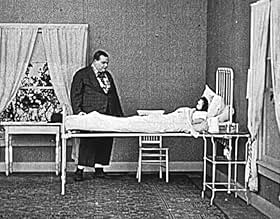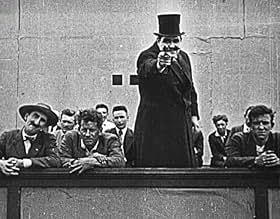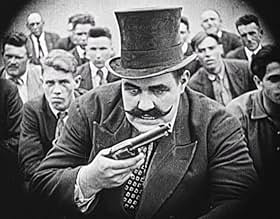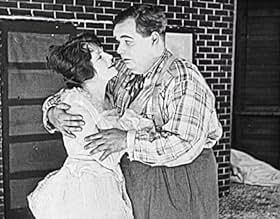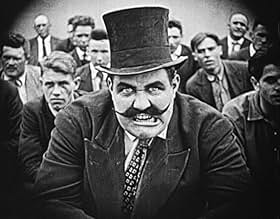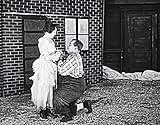Aggiungi una trama nella tua linguaWorking their fingers to the bone to prepare the set for an upcoming performance, the enthusiastic stagehands, Roscoe and Buster, find themselves on stage when the cast quits. However, is wi... Leggi tuttoWorking their fingers to the bone to prepare the set for an upcoming performance, the enthusiastic stagehands, Roscoe and Buster, find themselves on stage when the cast quits. However, is will alone enough to earn a big round of applause?Working their fingers to the bone to prepare the set for an upcoming performance, the enthusiastic stagehands, Roscoe and Buster, find themselves on stage when the cast quits. However, is will alone enough to earn a big round of applause?
- Regia
- Sceneggiatura
- Star
- Eccentric Dancer
- (as John Coogan)
- Minor Role
- (non citato nei titoli originali)
Recensioni in evidenza
On-stage, too, they exploit every last opportunity for misadventure, from heckling audience members to collapsing scenery (including an early example of Keaton's famed "falling edifice" gag, best-known from 1928's Steamboat Bill Jr.), with the usual amount of reckless tumbles and messy melees thrown in for good measure. More balanced than some of the duo's earlier pictures, with a number of fresh new bits, but it's missing a certain spark. Maybe their rigorous filming schedule (a dozen comedies together in the preceding two years) was beginning to take a toll.
The darkness in the comedy is ironic, because by bosom buddy Buster Keaton's account, in real life "Arbuckle was that rarity, a true jolly fat man. He had no meanness, malice, or jealousy in him. Everything seemed to amuse and delight him. He was free with his advice and too free in spending and lending money. I could not have found a better-natured man to teach me the movie business, or a more knowledgeable one. We never had an argument."
Fresh off being away for nearly a year in the army, Keaton stayed loyal to Arbuckle despite offers for significantly more money elsewhere. Change was in the wind for Arbuckle, however, as he had changed studios and lost many of the other people in his ensemble, including Alice Lake and (very soon) even nephew Al St. John, who barely appears here. Arbuckle was ill during production, delaying it, and perhaps all of these things led to a rather average film. This was a year before he would sign a mega-contract with Paramount, and two years before the Virginia Rappe scandal would unfairly ruin him.
There are some of the old Arbuckle standbys, including him and Keaton dressing up in drag and dancing, not much of which is very inspired. The limber (and likely coded gay) dancer John Coogan (Jackie's father) does the splits and various maneuvers both Arbuckle and Keaton try to follow, which was amusing. One of the funnier bits was an early version of a sign changing message when a portion of it is concealed, when a posting goes from "Gertrude McSkinny famous star who will play the little laundress first time here tomorrow at 2 pm" to the decidedly more ribald "Miss Skinny will undress here at 2pm."
The best, however, was the bit with the wall of a stage set falling down and just missing Arbuckle, who happens to be standing where one of the window cutouts is. Keaton of course would use this to much more dramatic effect in Steamboat Bill, Jr nine years later, and it was pretty cool to see this early version. Between this and the early version of Chaplin's bread roll dance in The Rough House (1917), you can really see the influence Arbuckle had on these giants of comedy, and his own place alongside them.
Like Keaton's later short, "The Play-House" (1921), this two-reel comedy gives viewers a distinct feel for the era of vaudeville--though from the perspective of the stagehands rather than the audience. It includes many fine gags built around various back-stage activities and the bumbling attempts of two stagehands, Arbuckle and Keaton, to act as performers.
The most interesting gag historically involves a scenery flat falling toward Arbuckle, with an upstairs window passing around him. Keaton later used an actual falling house front in the same manner twice in his own films: the 1920 short "One Week" (his first release as a solo artist) and, more dramatically, in the 1928 feature "Steamboat Bill Jr.," which was his last independent release (it does not appear in "Sherlock Jr." as stated elsewhere). The latter instance was an extremely dangerous stunt, which easily would have killed Keaton if he did not hit his mark precisely.
"Back Stage" is not their best film together, but it remains a very good Arbuckle-Keaton effort well worth viewing.
Lo sapevi?
- QuizIncluded in "Buster Keaton: The Shorts Collection" blu-ray set, released by Kino.
- Citazioni
Strongman's Assistant: [the act quits, to Buster and Fatty] We don't need them. Let's do the show ourselves!
- ConnessioniFeatured in Birth of Hollywood: Episodio #1.2 (2011)
I più visti
Dettagli
- Tempo di esecuzione26 minuti
- Mix di suoni
- Proporzioni
- 1.33 : 1

